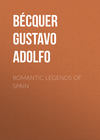Buch lesen: «Spanish Highways and Byways», Seite 14
The saint of El Dos de Mayo is Saint Revolution, as democratic in one way as Saint Agriculture in another. When these two patrons of Madrid understand how to work in fellowship, when there comes a Government in Spain that cares chiefly to promote the welfare of the laboring people, the world may discover anew the vitality and noble quality of this long-suffering nation.
We saw the Romeria once more, driving through late in the evening, when the closed booths glimmered white on the silent meadow.
"Yes, it is all a pack of lies," said a thoughtful Catholic, "but what is one to do? A man cannot believe in religion – and yet how to live without it? The more I stay away from mass the more I want and need it. Think of the comfort these peasants take with their San Isidro!"
The moonlight shone serene and beautiful on those patched, shabby tents, transforming them to silver.
XVI
THE FUNERAL OF CASTELAR
"The death of the Republic will be, for you, for us, and for all, the death of liberty. The death of liberty will be the death of the Republic, and as liberty is the only thing in the world that rises from the dead, with liberty shall rise again, in good time, the Republic." – Emilio Castelar: Inaugural Address, 1873.
The present state of Spanish politics was amusingly expounded to me by a spirited young philosopher of Cadiz.
"In the north," he said, "the prevailing sentiment is for Don Carlos. Nocedal is doing all he can to fan it in Andalusia, but it finds its natural home in the northern provinces. To be sure, there is San Sebastian, where the Court summers, which consequently upholds the Queen, and there are Republican groups; but the north of Spain, broadly speaking, is Carlist. The centre favors the reigning family. Possession is a strong argument, and the royal forces hold Madrid. Barcelona is Republican. Those Catalans are always thirsty for a fight. But the middle tract of Spain, as a whole, accepts the existing monarchy. Castilians are too gallant to strike against a woman and a child. The south is Republican. For the best part of the century Cadiz and Malaga have stood for revolution. Where was the army of Isabel II defeated? And why has the Queen never seen the Alhambra?
"But, let me tell you, these Carlists, these Royalists, these Republicans are all fools. If there is anything hopeless in this world, it's Spanish politics. All the uproar of the Revolution ended in murdering our best man and driving out our best king. For myself, I mean to work hard and marry soon, and have a little Spain in my own house that shall express my own convictions. My children shall be good Catholics, but not superstitious bigots. They shall be well educated, if I have to send them to France or England for it. They shall be disciplined, but under the law of liberty. And with that I propose to be content. All my politics are to be kept under my own roof, where I can work my ideas into permanent form. I am sick of the way in which Spain boils with ideas that only destroy one another."
This Sir Oracle was two-and-twenty, with the prettiest of girlish photographs in his vest pocket, and the smallest of savings in the bank, but I remembered his words in the days of mourning for Emilio Castelar.
The illustrious tribune, heavy-hearted with the troubles of his country, had gone to the home of friends, at a village in sunny Murcia, for the rest and comfort that nature always gave him. His almost boyish optimism, "niño grande y grande niño" that he was, had kept him assured of peace even after the destruction of the Maine, and assured of victory even after the battle of Manila. Hence the pressure of fact told on him all the more cruelly. "I die a victim of Spain's agony," he wrote in a personal letter shortly before the end, and his last article for publication, finished on the day of his death, a gloomy discussion of the outlook for the Peace Conference, contains bitter references to the national disasters and to the ravages of the "criminal troop of pirates in the Philippines."
He died on Thursday, the twenty-fifth of May, within hearing of the Mediterranean waves he loved so well, with tender faces bent over him, and the crucifix at his lips. The news of his death aroused this grief-weary nation to a fresh outburst of sorrow. Some lamented him as one of the chief orators of modern Europe, recalling his eloquence in the tempestuous times of the Revolution, when he "intoned mighty hymns in praise of liberty, democracy, and the sacred Fatherland!" Some mourned the patriot, pointing proudly to the honorable poverty in which this holder of many offices, at one time almost absolute dictator, had lived and died. Some wept for the cordial, generous, noble-hearted man, the joy of his friends and idol of his household. His political sympathizers bewailed the loss of the Spanish apostle of democracy, the lifelong champion of liberty. And many not of his following nor of his faith felt that a towering national figure had disappeared and another glory of Spain vanished away.
The first wreath received was from a Republican club that sent the pansies of memory. Among the five hundred telegrams and cablegrams that arrived within a few hours at the country-seat where he had died was one from over seas, which read: "To Castelar: In thy death it seems as if we had lost the last treasure left to us, the voice of the Spanish race. In thy death Spain has become mute. Yet let me believe that thou respondest, 'She will speak again.'"
The coming of the body to the capital was a triumphal progress. A large escort of friends, who had made speed to Murcia from all parts of the Peninsula, accompanied it, and there were crowds at the stations, even in the mid-hours of the night, with tears, handfuls of roses, wreaths, and poems of farewell. There was often something very touching about these offerings. At one of the smaller towns a young girl hastily gathered flowers from the garden attached to the station, broke off a spray from a blossoming tree, tied these with the bright ribbon from her hair, and, clambering up, hung this simple nosegay among the costly tributes that already nearly covered the outer sides of the funeral car. In another crowded station the village priest came hurrying forward, bared his head with deepest reverence before the garlanded coach, as if before the altar, and chanted the prayers for the dead. Again, a group of workmen, allowed to enter the car, fell on their knees before the bier and prayed.
The train was met on its arrival in Madrid by an immense concourse of people. Señor Silvela and other distinguished representatives of the Government were there, church dignitaries, presidents of political societies and literary academies, but, above all, the people. It was the great, surging multitude that gave the Republican leader his grandest welcome.
This poor shell of Castelar, the man said to bear "the soul of a Don Quixote in the body of a Sancho Panza," lay in state through Sunday and a part of Monday in the Palacio del Congreso. The vestibule had been converted into a capilla ardiente. Masses were chanted ceaselessly at the two candle-laden altars, the perfume from the ever increasing heaps of flowers was so oppressive that the guards had to be relieved at short intervals, and the procession of people that filed rapidly past the bier, often weeping as they went, reached out from the Morocco lions of the doorway to the Prado and the Fountain of Neptune. Many of the humblest clad, waiting half the day in line, held pinks or lilies, fast withering in the sun, to drop at the feet of the people's friend. Early on Monday afternoon the doors were closed, and by half-past three the funeral cortège began to form in the Prado for its four-hour march by way of the Calle de Alcalá, Puerta del Sol, Calle Mayor, and Cuesta de la Vega, to the cemetery of San Isidro.
By the never failing Spanish courtesy, I was invited to see the procession from the balcony of a private house in the Alcalá. I found my hostess, a vivacious little old lady, whose daughter had crowned her with glory and honor by marrying into the nobility, much perturbed over the failure of the Queen Regent to show sympathy with the popular grief.
"There were one hundred and forty-nine wreaths sent in. The very number shows that the royal wreath was lacking. I am a Conservative, of course. Canovas was my friend, and has dined here often and often. You see his portrait there beside that of my daughter, la Marquesa. But Canovas loved Castelar, and would not, like Silvela, have grudged him the military honors of a national funeral. As if the dead were Republicans! The dead are Spaniards, and Castelar is a great Spaniard, as this tremendous throng of people proves. There were not nearly so many for Canovas, though the aristocracy made an elegant display; there were not so many for Alfonso XII, though all that Court and State and army could do was done, and the Queen rode in the splendid ebony coach in which Juana the Mad used to carry about the body of that handsome husband of hers.
"But the people know their losses. Never in my life have I seen the Alcalá so full as this. Silvela has had to give way, and the troops will come – at least a few of them. But not a word, not a flower, from the Queen! She sent a magnificent wreath for Canovas, and a beautiful letter to his widow. But for Castelar, her people's hero, nothing. Ah, she is not simpática. She does not know her opportunities. She does not understand the art of winning love. Only a year ago she sent a wreath to the funeral of Frascuelo, the torero. And everybody knows how she hates the bull-fight. But if she could drop her prejudices then to be at one with the feeling of her capital, why not now? They say she has a neuralgic headache to-day. Ay, Dios mio! I should think she might."
Listening to this frank chatter and watching that mighty multitude, I was reminded of one of the Andalusian coplas: —
"The Republic is dead and gone;
Bury her out of the rain.
But see! There is never a Panteón
Can hold the funeral train."
And this, in turn, suggested another of those popular refrains: —
"The moon is a Republican,
And the sun with open eye;
The earth she is Republican,
And Republican am I."
But who can understand this ever baffling Spain? After all, what was the significance of that assembled host? How far was it drawn by devotion to the man, and how far by devotion to the idea for which he stood? How far by idle curiosity, by the Spanish passion for pomps and shows, and, above all, for a crowd, by that strange Spanish delight in mucha gente? So far as eye could tell, this might have been the merriest of fêtes. The wide street was a sea of restless color. Uniforms, liveries, parasols, hats, frocks, pinafores, kerchiefs, blouses, sashes, fans, flecked the sunshine with a thousand hues. Here loitered a messenger boy in vivid scarlet; there passed a waiter with a silver tray gleaming on his head; here a market woman bent beneath her burden of russet sacks bursting with greens; there stood a priest in shovel hat and cassock, smelling a great red rose; here a gallant in violet cape escorted a lady flaming in saffron; there a beaming old peasant, with an azure scarf tied over his white head, threw an orange to attract the attention of a plodding porter, whose forehead was protected from the cords binding the boxes to his back by several folds of purplish carpeting.
Streets and sidewalks, balconies and windows, all were full, and everywhere such eagerness, such animation, and such stir! The children sitting on the curbstone rocked their little bodies back and forth in excitement. Young mothers danced their crying infants, and young fathers shifted the babies of a size or two larger from one shoulder to the other. A boy in a red cap climbed a small locust tree, from whose foliage his head peeped out like an overgrown cherry. The crowd indignantly called the attention of authority to this violation of the city laws. A glittering member of the Civil Guard sonorously ordered the culprit down. The laughing lad refused to budge, inviting this embarrassed arm of the law to reach up and get him. The Guard darkly surveyed the slender stem already swaying with the boy's slight weight. The fickle crowd, whose every face seemed to be upturned toward that defiant cherry, cheered the rebel and tossed him cigarettes and matches, wherewith he proceeded to enjoy a smoke. The Guard caught a few cigarettes in mid-career, pocketed them, smiled benevolently, and walked away. The lad saucily saluted, and the multitude, suddenly impartial, pelted them both with peanuts.
Thus it was that the Madrid populace awaited the last coming of Castelar. Even when the funeral train was passing, the crowd showed scant respect. Not half the men uncovered for the bier, although I was glad to see the cherry cap whisked off. And one picturesque gentleman stood throughout with his back to the procession, making eyes at his novia in the gallery above our own.
The Government, which had finally assumed the charges and care of the obsequies, had been remiss in not providing lines of soldiers to hold an open way for the cortège. As it was, the procession could hardly struggle through the mass of humanity that choked the street. A solitary rider, mounted, like Death, on a white horse, went in advance, threatening the people with his sword. A division of the Civil Guard followed, erect and magnificent as ever, their gold bands glittering across their breasts, but their utmost efforts could not effectually beat back the crowd. Men scoffed at the drawn blades and pushed against the horses with both hands. The empty "coach of respect," black as night, its sable horses tossing high white plumes, pressed after, and then came some half dozen carriages overflowing with wreaths and palms, and all that wealth of floral gifts. The crowd caught at the floating purple ribbons, and called aloud the names upon the cards; a monster design, with velvet canopy, from the well-known daily, El Liberal, a beautiful crown from the widow of Canovas, and, later in the procession, alone upon the coffin, a nosegay of roses and lilies, brought in the morning by a child of four, a little "daughter of the people," and bearing the roughly written words, "Glory to Castelar! – A workingman."
The train of mourners, impeded as it was by the multitude, seemed endless. After the representatives of certain charities there walked, in gala uniform, white-headed veterans of war. A great company of students followed, their young faces serious and calm in that tempting hurly-burly of the street, and after them an overwhelming throng of delegates from all manner of commercial and craft unions. Even the press wondered that Castelar's death should move so profoundly the trading and laboring classes, almost every store and workshop in Madrid closing for the afternoon. Then came the Republican committees, and behind them the representatives of countless literary, scientific, and artistic associations.
At this point in the procession a place had been made for all or any who might wish, as individuals, to follow Castelar to the tomb. Some fifteen hundred had availed themselves of the opportunity – a motley fellowship. The gentlemen preceding, those who had come as delegates from the industrial and learned bodies of all Spain, wore almost without exception the correct black coat and tall silk hat, and paced, when they could, with a steady dignity, or halted, when they must, with a grave patience, that did more to quiet the unruly host of spectators than all the angry charges of the police. But the fifteen hundred showed the popular variety of costume – capes and blouses, broad white hats and the artisan's colored cap. Some of them were smoking, an indecorum which, by a self-denial that counts for much with Spaniards, nowhere else appeared in the long array.
But whatever might be the deficiencies of dress or bearing, here, one felt, was the genuine sorrow, here were the men who believed in Castelar and longed to do him honor. The impulsive onlookers responded to this impression, and more than one rude fellow, who had been skylarking a minute before, elbowed his way into the troop and fell soberly into such step as there was. Music would have worked wonders with that disorderly scene, but the bugles and cornets were all in the far rear. The representatives of the provinces, as they struggled by, were hailed with jokes and personalities. The chanting group of clergy, uplifting the same ebony cross that they had borne for Canovas, did not entirely hush the crowd, nor did even the black-plumed hearse itself, with its solemn burden. For close after came, bearing tapers, a group of political note, closed by Sagasta and Campos, and then the chiefs of army and navy, including Blanco and Weyler. Behind these walked the city fathers, the senators, the diplomats, ex-ministers, – among them Romero, Robledo, – then the archbishop, and, finally, Silvela, with his colleagues.
The procession was closed by a military display and a line of empty coaches, sent, according to Spanish custom, as a mark of respect. The coach sent by Congress, a patriotic blaze of red and yellow, with coachman and footman in red coats and yellow trousers, and horses decked with red and yellow plumes, looked as if it had started for the circus and had missed its way.
The sight of the politicians seemed to serve as spark to the Republican fuel. Even while the hearse was passing somebody shouted, "Long live Castelar!" but the crowd corrected the cry to "Long live the glorious memory of Castelar!" Then came a heterogeneous uproar: "Death to the friars!" "Long live the Republican Union!" "Down with Reaction!" "Down with the Jesuits!" "Down with Polavieja!" "Down with the Government!" "Up with the Republic!" "Long live Spain!" "Long live the army!" "Long live Weyler!"
A woman was run over in the confusion and a man was trampled, but the procession, aided as much as possible by the Civil Guards and the police, slowly worked its way through the Alcalá to the Puerta del Sol, where the people poured upon it like an avalanche, with ever louder cries against ministry and clergy, until the scene in front of the Government Building suggested something very like a mob. Silvela bore his silvered head erect and exerted a prudent forbearance. But few arrests were made, and the military force that sallied out from the Government Building merely stood in the gates to awe the rioters. After an hour and a quarter the transit of the square was effected. The disturbances were renewed in the Calle Mayor with such violence that the ministers were advised to withdraw, but they only entered the funeral coaches, and, the Guards exerting themselves to the utmost, a degree of order was at last secured. While the cortège was descending the difficult hill of La Vega, the Queen, standing in one of the palace balconies, opera glass in hand, sent a messenger for a report of the state of affairs in her capital, and was visited and reassured by a member of the Government.
After this stormy journey the cemetery of San Isidro was reached at nightfall, and the silent orator laid to rest in the patio of Santa Maria de la Cabeza, beside his beloved sister, Concha Castelar. Even here Republican vivas were raised, and again, later in the evening, before the house of Weyler, who appeared upon the balcony in answer to repeated calls. This general, more popular with Spaniards than with us, discreetly absented himself on Tuesday from the high mass chanted for Castelar in the Church of San Francisco el Grande, where there was an imposing display of uniforms and decorations.
While the people still talked of their lost leader and proposed monuments and medals in his honor, the Government held firmly on its course. The Royal Progress for the opening of the Cortes on the following Friday was a suggestive contrast to the procession of Monday. Soldiers lined the curbstones all the way from the Royal Palace to the Congress Hall, bands were posted at intervals, the royal escort, splendidly mounted and equipped, was in itself a formidable force, while additional troops, in gala dress, paraded all the city. The balconies along the royal route were handsomely draped, but the people looked on at the gorgeous array of coaches, gilded and emblazoned, each drawn by six or eight choice horses, with sumptuous plumes and trappings, and attended by a story-book pomp of quaintly attired postilions, coachmen, and outriders, in a silence that was variously explained to me as indicating respect, hostility, indifference.
I heard no vivas and saw no hats raised even for the affable Infanta Isabel, riding alone in the tortoise-shell carriage, nor for the Princess of Asturias, girlishly attractive in rose color and white, nor for the bright-faced young King, ready with his military salute as he passed the foreign embassies, nor for the stately Regent, robed as richly as if she were on her way to read a gladder message than that which the opposition journals indignantly declared "no message, but a pious prayer of resignation."
And while Madrid jarred and wrangled, the flowers brought by the little daughter of the workingman drooped on the marble slab above Castelar's repose.

















